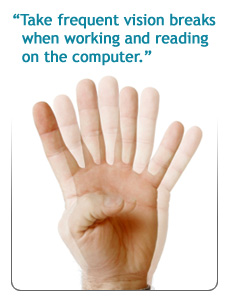 These symptoms can be scary: double vision, headaches, blurred vision, neck pain, fatigue, and irritated eyes that may not refocus when they should. However they don’t mean you necessarily have a serious illness. Of course, you should always discuss health concerns with your doctor. If you work in front of a computer frequently, and who doesn’t, the problems listed above are most likely signs of an aggravating and potentially work disrupting condition dubbed Computer Vision Syndrome (CVS).
If that’s the case, you aren’t alone. After all, computers are a part of our daily lives in the 21st century. According to the United States Bureau of Labor Statistics, 100 million people in the United States use computers at their jobs daily. All it takes is two or more hours in front of the computer screen for most people to experience at least some CVS symptoms from time to time. It comes as no surprise that studies indicate that 50 to 90 percent of computer users show signs of the syndrome at one time or another.
 Getting the facts about CVSJust how serious is CVS? "It is not a vision threatening eye problem, nor does it lead to one. It can, however, cause significant discomfort," Emily B. Graubart, MD, Assistant Professor of Ophthalmology at the Emory Eye Center and Emory University School of Medicine in Atlanta, tells Synergy.
As its name implies, CVS is a syndrome, meaning it is a group of conditions associated with computer use and not a specific disease or disorder. The most frequently reported symptoms, according to Dr. Graubart, are dry and irritated eyes, blurred vision, and headaches.
The syndrome has become so common that researchers have recently found that even children are reporting CVS-related problems. However, there’s one group that seems to be hit the hardest, folks reaching middle age.
"While it affects many individuals who spend the majority of the day on the computer, people who are in their mid-forties often begin to notice more symptoms," Dr. Graubart tells Synergy. "This is due to their emerging presbyopia or the need for reading glasses."
CVS self-helpFortunately, there’s relief for CVS sufferers in sight. In fact, you can often relieve your CVS symptoms with some self-help strategies. For example, Dr. Graubart advises using over-the-counter, preservative-free artificial tears as the first line of defense against CVS.
"These can be used as often as needed to relieve dryness and irritation. CVS symptoms often result from decreased blinking during computer use. So blinking several times in a row and using an artificial tear product will help eliminate blurring of the computer screen by lubricating the surface of the eyes," she notes.
It’s also a good idea to take frequent "vision breaks" when you are reading and working on the computer. Try to get into the habit of looking away from your computer screen every 15 or 20 minutes or so. "These breaks will help in many instances. Looking at a distant object will help relax your eye muscles," Dr. Graubart explains.
 In addition, you may need to adjust your work environment to make it more computer vision friendly in order to relieve or avoid CVS symptoms.
Dr. Graubart has these tips to prevent CVS triggers:
- If the air in your office or the room in your home where you use your computer is very dry, it can aggravate CVS. Consider using a humidifier if necessary.
- Make sure your computer screen is placed directly in front of you.
- Comfortable seating is important when you are working. It helps keep neck muscles relaxed, alleviating the strain and discomfort associated with prolonged computer use. The result can be less fatigue and fewer headaches.
- Lighting plays a role in CVS. "However, the type of lighting that works best varies from one individual to another," Dr. Graubart notes. "The goal is to reduce glare and reflections from the computer screen."
- Try changing the contrast on your computer monitor to see if that relieves symptoms.
When to see an eye doctor"Computer eyeglasses" specifically designed to supposedly relieve CVS symptoms are now widely available and marketed without a prescription. But are they effective? And how do they differ from your regular prescription eyeglasses?
"So-called ‘computer glasses' are marketed to decrease glare from computers screens. Most have some sort of a tint," Dr. Graubart answers. "I would recommend getting a comprehensive eye exam before you invest in these glasses. The evaluation for needing a tinted pair of glasses should be made with the help of an ophthalmologist and optician."
In fact, it’s a good idea to talk to your ophthalmologist about any specific issues you are having with your computer work and vision. "Often an adjustment in your glasses or contact lens prescription along with some artificial tears will resolve the problem and may alleviate the CVS symptoms you are experiencing," Dr. Graubart tells Synergy.
|